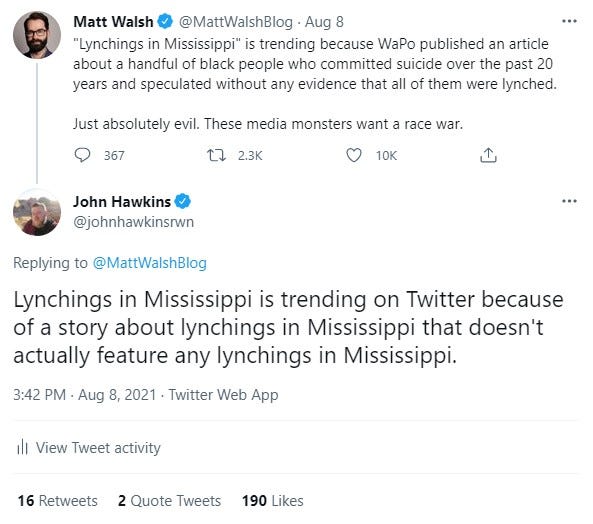How Doritos Journalism Corrupted the News Business and is Wrecking America
Welcome to the world of Doritos journalism.
A publication I created and ran, Right Wing News, was one of the earliest, most successful adopters of Facebook in the news business. In fact, we were so dominant at one point that there is at least one researcher who believes we must have gamed the system somehow:
In terms of historical engagement on Facebook, Right Wing News, a page representing a small (Hawkins' note: We were top 7,000 in the world at one time) news outlet line run by (John Hawkins), basically had no peers in the news industry on Facebook until the final stretch of the 2016 election.
...The above graph also shows that for all its liberal-hating fame, Breitbart’s Facebook page has 250 million more interactions to go before it even gets close to the kind of numbers that Right Wing News page had before it was taken down.
From the time of Obama’s 2012 re-election well into the 2016 election of Donald Trump, the pages of up-and-coming, arguably more popular right-wing news media—including Breitbart, Daily Caller, and the Western Journal—did not have anywhere near the kind of engagement that Right Wing News received on Facebook.
Between 2013 and 2016, Right Wing News and its affiliate pages consistently saw more interaction on Facebook than the pages of many of the largest news media in the country: the New York Times, the Washington Post, and Fox News. Combined.
How were we able to do that? It was mainly because I was way ahead of the curve in the outrage business and the outrage business is different than the news business.
You may say, “What’s the difference?”
Well, the old paradigm people used to work under in the news business prior to social media coming of age was something closer to the combination of the slogan of the New York Times, “All the news that’s fit to print” and Fox News’ “Fair and balanced.” In other words, a news source was expected to cover the most important news of the day in an accurate and unbiased way.
Did news sources fall short of that goal? Absolutely, but they did care about being accurate and at least giving people the impression that they were being fair.
My philosophy was a little different. I certainly cared about getting the story right, but I wasn’t interested in giving people all the important news of the day for a simple reason. A lot of important news is boring and when your traffic is driven by social media, why bother writing a boring story no one is going to read? You can talk about the debt, the threat posed by North Korea, or write an in-depth analysis of the national highway system and guess what? It’ll get zero traffic.
Know what did get traffic? Things that made people FEEL. Confirmation that they were right. Stories that made them say, “I relate to that guy, and I would have done the same thing in that controversial situation.” Stories that made them outraged. Many of these stories that did the best for us were not national news in the conventional sense. A dad beating some guy who molested his daughter to death, welfare recipients freaking out because they were told they had to work, or a sad father warning people after his son died of a drug overdose might be the sort of thing people are really interested in watching but is it really news you need to know to be informed?
Obviously not and I knew that, but I looked at it as giving people the news they wanted, not the news they needed. It was sort of like junk food. We were Doritos. Doritos taste good, they’re easy to consume, and people like eating them. Should you be eating Doritos? Probably not, but a few of them aren’t going to hurt you, especially if the majority of your diet is made up of good, nutritious food. As long as someone else is telling you what’s going on in foreign policy, what Congress is doing, and covering the big issues that impact the country, eating a few Doritos isn’t going to hurt you.
Fast forward to today, when the news business has become more competitive, more social media-driven, and more ideological and people are eating Doritos all day long. For example, the Washington Post just did a story about black Americans in Mississippi that committed suicide by hanging, that some people, for no good reason really, thought could be lynchings.
Is that really a news story in any meaningful sense? How about this story? Some guy at a Colorado Rockies game yelled for the team’s mascot, Dinger, to come over to him and some people thought he said the N-word.
A decade ago, even if the man had shouted the N-word, maybe the local paper or a sports show covering the game might have mentioned it, but it’s pretty unlikely that story would have been national news because quite frankly, it’s generally irrelevant. The world is full of morons doing moronic things. If some homeless guy craps in the middle of Walmart in South Dakota or a “Karen” in Manhattan calls the cops on some kids hanging out at the park she thinks looks “suspicious,” so what? How does that impact anyone’s life across the country? Of course, it’s doesn’t. It’s pure Doritos.
This matters not just because being immersed in these stories all day long makes us all more ignorant, but because in a competitive environment, it inevitably leads to news organizations stretching the truth to get that tasty new flavor of Doritos no one else has yet. The number of stories based on anonymous sources that the mainstream media ran with in the Trump era seemed endless and an awful lot of them, if they were ever confirmed one way or the other, seemed to be shown to be false. Lefty Glenn Greenwald, who has been a ferocious critic of the shoddy journalism of the last few years, did a top ten list of some of the worst offenders in the mainstream media in this respect. Just to get a sense of it, here are only SOME of the dishonorable mentions that didn’t even make Greenwald’s list.
· The U.S. media and Democrats spent six months claiming that all “17 intelligence agencies” agreed Russia was behind the hacks; the NYT finally retracted that in June 2017: “The assessment was made by four intelligence agencies — the Office of the Director of National Intelligence, the Central Intelligence Agency, the Federal Bureau of Investigation and the National Security Agency. The assessment was not approved by all 17 organizations in the American intelligence community.”
· The New York Times claimed Manafort provided polling data to Russian oligarch Oleg Deripaska, a person “close to the Kremlin”; in fact, he provided them to Ukrainians, not Russians.
· CrowdStrike, the firm hired by the DNC, claimed they had evidence that Russia hacked Ukrainian artillery apps; they then retracted it.
· Bloomberg and the WSJ reported Mueller subpoenaed Deutsche Bank for Trump’s financial records; the NYT said that never happened.
· AP claimed on February 2, 2018, that the Free Beacon commissioned the Steele Dossier; they thereafter acknowledged that was false and noted, instead: “Though the former spy, Christopher Steele, was hired by a firm that was initially funded by the Washington Free Beacon, he did not begin work on the project until after Democratic groups had begun funding it.”
· Widespread government and media claims that accused Russian agent Maria Butina offered “sex for favors” were totally false (and scurrilous).
Why does the mainstream media that used to spend so much time bragging about their layers of fact-checkers run shoddy stories with suspect sourcing that are often proven false? Because steak and vegetables don’t sell anymore and they need Doritos, even if they have to create them from whole cloth. We’ve seen this same phenomenon repeated endlessly with COVID as well. How many times have we seen stories about ICUs being overrun with COVID patients in the mainstream media that later turned out to be untrue? 20? 50? 100? It’s a constant thing.
Even when the media isn’t publishing shoddy work, they can create havoc with the things they do focus on. The whole Black Lives Matter movement was built on Doritos reporting. The vast majority of the stories that led to the riots, arson, and looting we saw this summer were local stories that should have never been national news in the first place. Yet, the stories were dishonestly reported and hyped endlessly not because they had genuine news value to people across the country, but because they fueled a narrative and drove traffic. In the Trayvon Martin case, the mainstream media falsely gave people the impression he was a little kid with an old picture, told the public the Hispanic guy who killed him was white and hid all the exculpatory details until weeks after the story broke. Remember “Hands up, don’t shoot” in the Mike Brown case? That never actually happened and why exactly is some dirtbag criminal in Mississippi who attacked a cop and ended up getting shot national news in the first place?
We’ve now gotten to the point where politicians and organizations are responding to the incentives that are being offered up in the mainstream media. The people in charge care less than ever about making people’s lives better because they’re focused on the sort of trivia that gets attention in the world of Doritos journalism.
Does this actually make anyone’s life better? No. But see, if you come up with say an innovation that makes housing cheaper or that helps more people afford a home, that’s boring. On the other hand, striking a blow against slavery or something by getting rid of the term “master bedroom” catches the attention of Doritos journalists. That is Doritos journalism for you. Remember when I said earlier that eating a few Doritos isn’t bad for you? Well, that’s probably true. However, what happens if you abandon all your nutritious food and eat nothing but Doritos all day long? Well, you’re going to die, or at least your society is because it can’t survive on all junk news. I’m not proud to be one of the people that helped popularize Doritos journalism, but the toothpaste is out of the tube. At this point, all I can do is point out that we’ve embraced a system of incentives that leads to the media being less honest, the public being less informed, and politicians and organizations focusing on symbolic actions instead of improving people’s lives. It’s bad in every way for our society and it’s all they’re feeding us anymore.





My "radical" belief: social media and the modern axis of port-side mainstream media outlets are the worst thing to happen to this country since slavery.
Loved the piece, John. Don’t mean to oversimplify things but it would seem to me that there is an insatiable demand for the Doritos these days and a devil’s advocate might say the corporate media are just feeding the pigs while they are hungry. Seems to me we have a bad cocktail of shorter attention spans, tribal politics and we both know we aren’t getting any smarter as a society and I expect the dumbing down of our society is about to get worse with the new math and history curriculum. Just signed up and looking forward to catching up on the archives